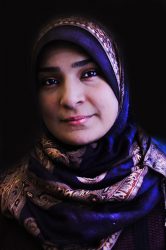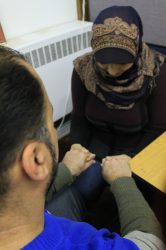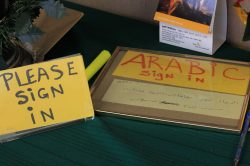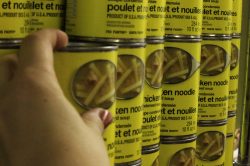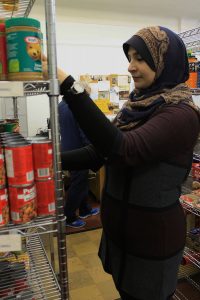
Sawsan Al-Oudeh fills the shelves of the Divine Mercy Food Bank with donations.
She had hoped the plane would be their bridge to a safer life. She never dreamed that stepping onto unfamiliar land would not only liberate her from the turmoil in her homeland, but even from her own shyness.
Back in Syria and barely in her 20s, before her country became too dangerous to live, Sawsan Al-Oudehin had butterflies in her stomach as a nervous and scared kindergarten teacher, eager to feed inquiring little minds on her first day.
“How can I deal with them? How can I give them the correct idea?” Al-Oudeh recalls worrying.
However, her time in the job she would come to love was short-lived. The tension in her homeland became too dangerous for her — a Christian.
Like many others fleeing hate, uncertainty and fear, Al-Oudeh, her husband and sister-in-law made the heartbreaking decision to leave behind careers, culture and family. It was a decision that would become even more difficult.
“Before I leave, my father died, before three months. So it was very hard to leave my family with this sadness.”
They started a journey that found them across the ocean, met with new fears. Registered through the United Nations, Al-Oudeh and her family were told they would be moving to Windsor.
Now, closer to her 30s, with butterflies in her stomach once more, Al-Oudeh found herself at the mercy of Canadian hospitality.
“When we came here we didn’t know how to deal with people, how to understand them. We have like a little bit of English,” says Al-Oudeh, confident in her ability to speak the language now.
In a time when some Canadians were outspoken with their anger over refugees coming to Canada, more were opening their homes, collecting donations and preparing programs to help the newcomers adjust to their new environment.
Organizations like W.E.S.T. (Women’s Enterprise Skills Training) helped Al-Oudeh.
“They can help the refugees with this stuff. Learning English, some appointments for translation and they have a lot of programs to improve skills and help you to find a job,” says Al-Oudeh.
Al-Oudeh soon realized these programs would be instrumental in leading her back onto a path of purpose.
The Society of Saint Vincent de Paul’s Divine Mercy Food Bank became her sanctuary and gave her an opportunity to give back to those who helped in her darkest hours.
Al-Oudeh was not accustomed to this kind of charity.
“It was a little bit scary but I know my situation, I will not survive if I don’t come to an organization like this,” she says. “I need the help.”
Al-Oudeh’s first visit to the food bank is remembered fondly.
“She was very quiet, she didn’t ask for much. She understood the food bank and what the need is and she understood that it was generosity of people who help this food bank that gives food to people,” says Yvette Drouillard, president of Divine Mercy Food Bank.
The concept of a food bank is new for Al-Oudeh.
“We don’t actually have a food bank in our country,” says Al-Oudeh, inspired by the generosity of this organization.
“It shows how the people are sensitive for each other. If I can eat…you can eat. I like that idea. Here, everyone can live, everyone can eat.”
However, the basic life necessities provided by the food bank was not what helped Al-Oudeh succeed the most. It was an opportunity given to her by Drouillard.
“One day we were really busy, short on interviewers and we had an influx of refugees that day that only spoke Arabic. She happened to be in with her aunt,” says Drouillard.
Al-Oudeh was asked if she could assist the food bank by translating for those who didn’t speak english and she agreed.
Drouillard quickly sensed the kind of woman Al-Oudeh was as she watched her patiently interview and pray with patrons.
“Would you like to volunteer here?” asked Drouillard. “We get a lot of Arabic and we need somebody who can speak it.” Al-Oudeh agreed.
Al-Oudeh is continuing her education and has improved her English. She is also getting her driver’s license and taking exercise classes.
Through the hospitality of her new country, Al-Oudeh has emerged from a shy girl with an uncertain future to a confident charitable person.
Although she has started a new life in Canada, some things are similar to her life in Syria.
Once again, she finds herself in a familiar position of helping people. This time, instead of knowledge, she is feeding people food and still finds herself wondering how she can deal with them, how she can give them the correct idea.
She knows that even the small things in life can make a big impact and plans to continue volunteering with other organizations, particularly hospitals.
“I am proud of myself and my husband because I can do something for people now and I want to tell everybody, if you can do anything to help each other—do it!” urges Al-Oudeh with her hands clasped in a praying gesture.
The decision to board a plane and leave her familiar life behind was a scary one, but it has given Al-Oudeh a new appreciation for life.

